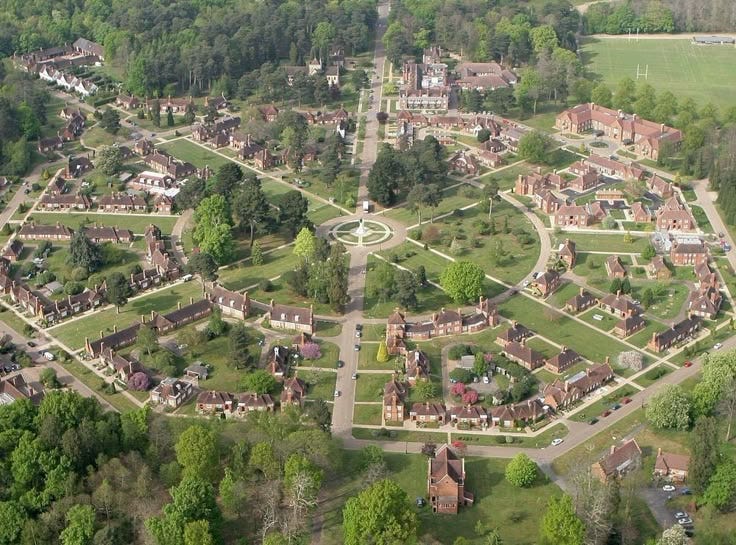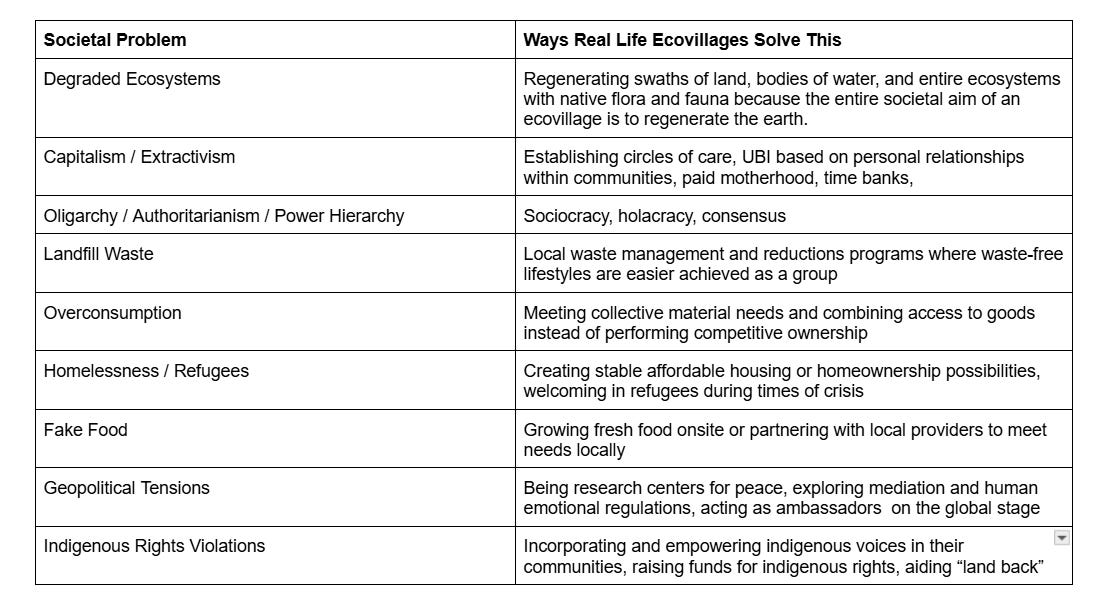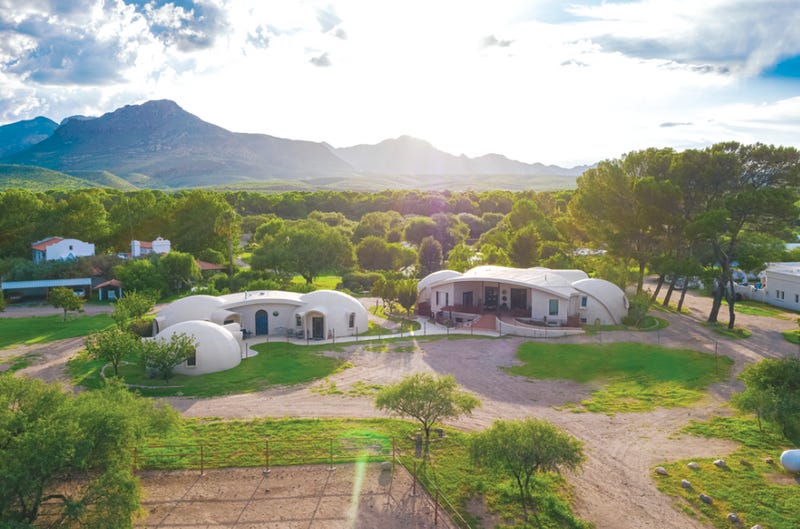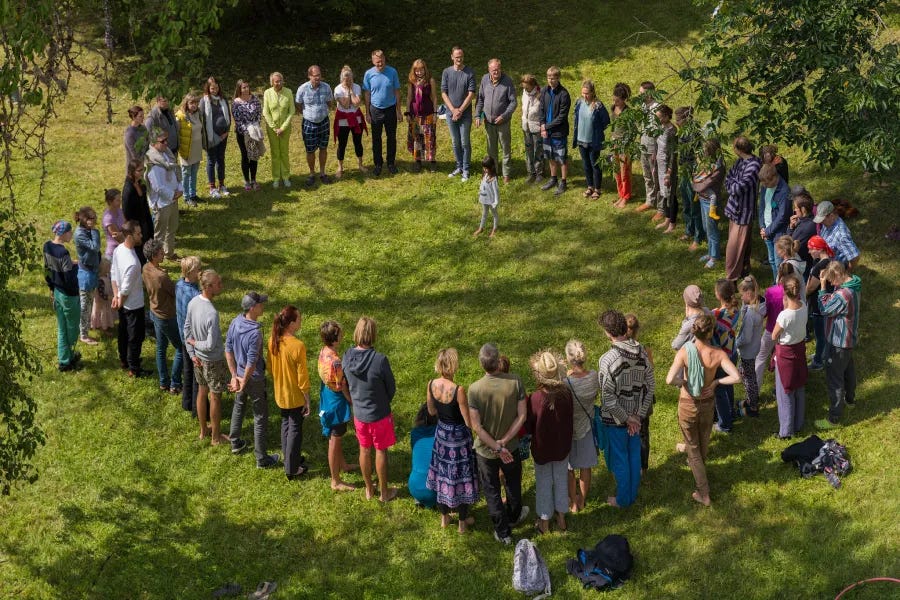I’m living in the US right now.
It feels like a slow motion nightmare where you’re watching clowns with thick makeup chase you, but your limbs are heavy and you can’t lock the door to your house in time, and you open your mouth to scream but nothing comes out.
Authoritarianism by any other name would smell as sour.
Yet, I dissociate. I’m deliberating whether I have committed so wholly to building my vision for society — equitable, thriving, fulfilled — that I blind myself to the steps necessary to resist with honor.
I remain firm on the idea that building local scale, self-sufficient, experimental, and holistically regenerative communities is the best way to redesign a beached whale of a society.
In fact, last Friday, I spoke about this at the Intentional Communities Summit, hosted by the creators of Exit & Build. The idea is to build an alternative society that outcompetes (and even subtly sabotages) the failing society we were born into.
The same way I divested my money from banks that funded oil and gas, we can divest our money, time, talents, attention, and labor from this extractive system in order to weaken it. We can then pour that value into designing regenerative villages and sovereign nations.
This will be an act of freedom.
The Anti-Establishment Qualities of Ecovillages and other Startup Societies
Why do I believe that societal redesign is possible through ecovillages? Here is what each aspect of these communities can achieve:
Local Scale — Relevant to and built by the communities that live in them, these places will be stewarded with honorable care. Local scale is easier to manage without needing the complexity of overly bureaucratized systems, favoring instead circles of care.
Self-Sufficient — If our goal is to redesign society, we want to weaken our dependence on defunct systems that barely meet our basic needs. This means food, water, energy, waste, and eventually material goods production, medicine, and more, can all be handled onsite. Taxation should even remain largely local.
Experimental — These places should be safe spaces to test out alternative governance systems, new forms of economy, and all things outside of “business as usual”. We can treat these communities like startups that are innovating faster than their established competitors with a monopoly on how the world runs.
Holistically Regenerative — This means being ecologically, socially, economically, and culturally restorative. This includes efforts to restore ecosystems, eradicate bigotry/inequity, explore inclusive commerce, and establish more healthy worldview paradigms.
If we combine these aspects in our new communities, we aren’t just running away from the problems, we are the solution.
A Polysolution to a Polycrisis
Anyone awake knows that we are facing a polycrisis. I won’t list all the failure points, because frankly it depresses me. You can read
’s article “Explaining Polycrisis and Metacrisis” for more.Now, I love ecovillages. I’m obssessed with them, in fact.
What stirs my the cauldron of my body’s blood is the fact that the more I study ecovillages, the more their societal significance becomes shockingly clear. Regenerative communities offer a suite of solutions to the polycrises dismantling life on planet earth. They could solve almost everything, if done right.
I started referring to ecovillages as a polysolution for many reasons. If you name any major societal issue, I can quote how ecovillages address that, and can point to living examples in an existing community.
Why Redesign
Perhaps a better word is reengineer, because the way society is moving, we can’t just upgrade the branding. We need to overhaul every. single. broken system.
We are experiencing what professor of anthropology Alexei Yurchak coined as hypernormalization. A social phenomenon (derived from the delusions of the Soviet Union as it came to its end) when a societal system is failing, but no one can imagine any alternative to the status quo, and politicians and citizens alike are resigned to maintaining the pretense of a functioning society.
People will tell you that the system does work, it’s just you that is broken. You’re not capitalizing enough. There are no demographical barriers to success. Hustle harder.
We know that’s a lie, a pretense. We need a real course of action. For me, ecovillages are about taking back power. Exiting a broken system and building a much better one.
How We Can “Exit & Build”
There are a few key pieces to building ecovillages as a form of resistance:
Sovereignty - attaining legal autonomy from existing systems
This one is the hardest, because there are few precedents for it, but we can look to the network state movement for models. For example, you only need 1 million people to apply to be a country, and they don’t all have to live in the same contiguous territory.
Self-sufficiency - building infrastructure and assets that allow you to meet communal needs without dependence on monopoly commercial systems
By withdrawing your money and spending it elsewhere, you define the market. By withdrawing the need for money at all, you create an entirely new market.
Solidarity - cultivating local networks of trust and care
Traditional systems make money when you are broken down, isolated, and competing with others. Small local networks of solidarity lay the groundwork for the collaboration necessary to exit.
Look to fold these elements into any community that you build.
What The Future Holds
Tonight, after a political talk, one of our community members started singing “It’s the end of the world, as we know it…”.
And it’s true! But it’s also exciting, even while grappling with the outrage and despair. We need part of the current world to die.
One of these nights, I read a few stories about the current US administration and then laid down for bed, and could feel this dragon wake up inside of me. The outrage, the tsunami of futility.
Societal redesign sounds flashy, like an upgrade you can download in 3 minutes. But the real work is slow culture shift. This is the thought that empowers me to think my work can have real impact on the long horizon.
These are the opening words I wrote to the Global Ecovillage Network in our newsletter this month:
We’ve come a long way from building small homesteads and islands of sanity in nature. Now we are a global network of ecovillages in a modern world, sharing knowledge and growing our impact.
We have the opportunity to share the social and ecological innovations practiced by ecovillages with the world, but only if we learn to coordinate at more sophisticated levels.
You are part of a social movement that could change the way we live. Faced with tyranny, collapse, or disaster, we will prevail if we embrace radical collaboration.
Together, we are the resilience.
Connect with Nicole
Are you new here? Subscribe to this newsletter for free
Follow me on LinkedIn for more insights
Make an inquiry for 1:1 community consulting










I think the scale of significant self sufficiency is the bioregion. But I can imagine a network of ecovillages and other support structures across each bioregion collaborating to create the systems needed for the flourishing of life.
I'm an expat living in Brazil and, as crazy as politics get here, I've never been happier to not be in the US, which seems positively, yeah, nightmarish at the moment.
I loved the post and the ideas you presented. I want something like this so badly, it makes me want to cry. No lie. Part of why is, I think, because it feels so within our reach; a matter of will not technology or even money or some other resource.